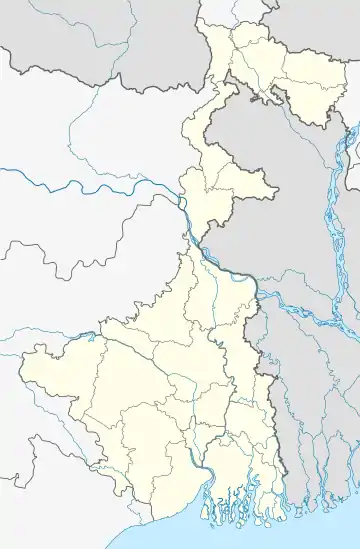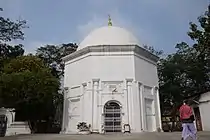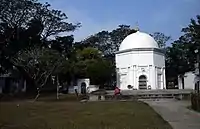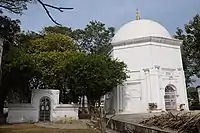Sidheswari
Sidheswari is a village in the Cooch Behar II CD block in the Cooch Behar Sadar subdivision of the Cooch Behar district in West Bengal, India
Sidheswari | |
|---|---|
Village | |
 Sidheswari Location in West Bengal, India  Sidheswari Sidheswari (India) | |
| Coordinates: 26.38673°N 89.51272°E | |
| Country | |
| State | West Bengal |
| District | Cooch Behar |
| Population (2011) | |
| • Total | 4,467 |
| Time zone | UTC+5:30 (IST) |
| PIN | 736133 |
| Telephone/STD code | 03582 |
| Vehicle registration | WB |
| Lok Sabha constituency | Cooch Behar |
| Vidhan Sabha constituency | Cooch Behar Uttar |
| Website | coochbehar |
Geography
| Places in the Cooch Behar Sadar subdivision in Cooch Behar district CT: census town, M: municipal town, R: rural/ urban centre, H: historical/ religious centre Owing to space constraints in the small map, the actual locations in a larger map may vary slightly |
Location
Sidheswari is located at 26.38673°N 89.51272°E.
Area overview
The map alongside shows the north-central part of the district. It has the highest level of urbanisation in an overwhelming rural district. 22.08% of the population of the Cooch Behar Sadar subdivision lives in the urban areas and 77.92% lives in the rural areas.[1]The entire district forms the flat alluvial flood plains of mighty rivers.[2]
Note: The map alongside presents some of the notable locations in the subdivision. All places marked in the map are linked in the larger full screen map.
Demographics
As per the 2011 Census of India, Sidheswari had a total population of 4,467. There were 2,327 (52%) males and 2,140 (48%) females. There were 496 persons in the age range of 0 to 6 years. The total number of literate people in Sidheswari was 3,382 (85.17% of the population over 6 years).[3]
Transport
New Baneswar railway station, on the New Jalpaiguri–New Bongaigaon section of the Barauni–Guwahati line, is about 1.6 kilometres (0.99 mi) from Sidheswari.[4][5]
Culture
The temple of Sidheswari Devi is a brick-built structure having an unusual octagonal shape with a dome on top of it. It has a height of 9.3 metres (31 ft). There is a raised platform in front of the temple. The internal distance from one corner of the temple to another is around 2.5 metres (8 ft 2 in). The 15.5 centimetres (6.1 in) tall idol of Sidheswari Devi in the garbhagriha is made of ashtadhatu. The four-handed goddess is worshipped as a form of goddess Kali. According to Madho Sarup Vats, of the Archaeological Survey, the temple is an example of British architectural influence. He particularly points out the pillars in the structure. The temple seems to have been built by the Maharajas of Cooch Behar State in end 19th century or early 20th century.
Sidheswari temple picture gallery
The pictures are a part of Wiki Explores Cooch Behar programme, an initiative by West Bengal Wikimedians User Group
References
- "District Statistical Handbook 2013 Cooch Behar". Tables 2.2, 2.4b. Department of Planning and Statistics, Government of West Bengal. Archived from the original on 21 January 2019. Retrieved 5 August 2020.
- "District Census Handbook, Koch Bihar, Series 20, Part XIIA" (PDF). Census of India 2011, pages 17-21 Physical feafures. Directorate of Census Operations, West Bengal. Retrieved 5 August 2020.
- "C.D. Block Wise Primary Abstract Data(PCA)". West Bengal – District-wise CD Blocks. Registrar General and Census Commissioner, India. Retrieved 9 August 2020.
- Koch Bihar Jelar Purakirti (in Bengali), Data compilation and writing by Dr. Shyamachand Mukhopadhayay, published by the Department of Archaeology, Government of West Bengal, Second edition 1974, Pages 59-61.
- "Rangiya New Jalpaiguri Express". Time Table. IndiaRailInfo. Retrieved 10 August 2020.
External links
| Wikimedia Commons has media related to Siddheshswari Temple, Cooch Behar II CD block. |


